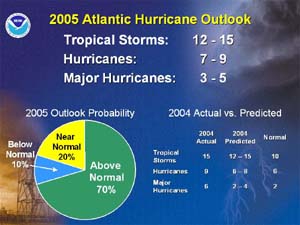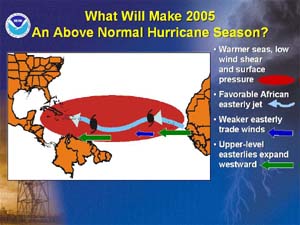Hurricane Forecasts for
2005: Where do we Stand?
Written October 23, 2005
As this record hurricane season progresses with the recent
appearance of Tropical Storm Alpha, formed from the 25th depression
of 2005, some aspects of the public are still thinking the scientists of the
United States have
predicted this current trend and the current up tick is part of a normal AMO cycle.
Respected hurricane forecaster William Gray of Colorado State University (Gray’s
Atlantic 2005 hurricane Forecast) and NOAA’s Atlantic 2005 Hurricane
Forecast (below) both predicted an above active season, so how accurate
were they when the rest of the world has been stating for several years, we have
a problem? With all their models and data, a trend 135% of normal was far short
of the real totals. Both have come back to revised their totals to reflect a
record July, but again with 6 weeks left in the year 2005 we are already past
their revised predicted
maximum from late August again. The above normal hurricane trend is
being blamed on several factors, which is explained in the NOAA graphic # 3
below along new a new trend all of which has been proven
false. One only has to review the season to find that most of the storms
formed in the Caribbean and the western Atlantic not off the coast of Africa. What is confusing the public is whom
to trust. The
absence of certain governments from global warming conferences, the down playing
of current events and severe storms while most of the rest of the world is very concerned is now
polarizing the Earth's population. During the next few years habitability along coastal
regions of hurricane prone areas will transform the concern of a nation from apathy and belief of
scientists within the U.S. to outright dismissal of their official forecasts,
explanations, reports and actions of help to those in need.
Mankind will metamorphose itself into a more proactive society independent of
government support and leadership.
All Rights Reserved: © Copyright 2005
Related
Articles
Katrina:
Reduction of Wind Speeds
The
Arrival of the Super Storms
Hurricane
Trends
Storm
Lessons
NOAA
ISSUES 2005 ATLANTIC HURRICANE SEASON OUTLOOK
Another Above Normal Season Expected
 May
16, 2005 — NOAA hurricane forecasters are
predicting another above-normal hurricane season on the heels of last year's
destructive and historic hurricane season. "NOAA's prediction for the 2005
Atlantic hurricane season is for 12 to15 tropical storms, with seven to nine
becoming hurricanes, of which three to five could become major hurricanes,"
said retired Navy Vice Adm. Conrad
C. Lautenbacher, Ph.D., undersecretary of commerce for oceans and atmosphere
and NOAA administrator at a news conference today in Bay St. Louis, Miss.
"Forecaster confidence that this will be an active hurricane season is very
high." (Click NOAA satellite image for larger view of Hurricane
Ivan taken Sept. 15, 2004, at 11:15 a.m. EDT before slamming into the USA Gulf
Coast. Ivan was one of four hurricanes to strike the state of Florida in 2004. Credit
“NOAA.”)
May
16, 2005 — NOAA hurricane forecasters are
predicting another above-normal hurricane season on the heels of last year's
destructive and historic hurricane season. "NOAA's prediction for the 2005
Atlantic hurricane season is for 12 to15 tropical storms, with seven to nine
becoming hurricanes, of which three to five could become major hurricanes,"
said retired Navy Vice Adm. Conrad
C. Lautenbacher, Ph.D., undersecretary of commerce for oceans and atmosphere
and NOAA administrator at a news conference today in Bay St. Louis, Miss.
"Forecaster confidence that this will be an active hurricane season is very
high." (Click NOAA satellite image for larger view of Hurricane
Ivan taken Sept. 15, 2004, at 11:15 a.m. EDT before slamming into the USA Gulf
Coast. Ivan was one of four hurricanes to strike the state of Florida in 2004. Credit
“NOAA.”)
 NOAA's
Atlantic hurricane outlook reflects an expected continuation of
above-average activity that began in 1995. Since that time all but two Atlantic
hurricane seasons have been above-normal. Hurricane season starts on June 1 and
ends November 30. (Click NOAA image for larger view of 2005 Atlantic
hurricane season outlook. Please credit “NOAA.”)
NOAA's
Atlantic hurricane outlook reflects an expected continuation of
above-average activity that began in 1995. Since that time all but two Atlantic
hurricane seasons have been above-normal. Hurricane season starts on June 1 and
ends November 30. (Click NOAA image for larger view of 2005 Atlantic
hurricane season outlook. Please credit “NOAA.”)
"Impacts
from hurricanes, tropical storms and their remnants do not stop at the
coast," states retired Brig. Gen. David
L. Johnson, director of the NOAA National
Weather Service. "As we kick off National
Hurricane Preparedness Week and look at another highly active season,
preparation plans should consider that these storms carry severe weather, such
as tornadoes and flooding, while moving inland."
Although it's too
soon to predict where and when a storm may hit land, NOAA still cautions the
public to be prepared.
"Last
year's hurricane season provided a reminder that planning and preparation
for a hurricane do make a difference. Residents in hurricane vulnerable areas
who had a plan, and took individual responsibility for acting on those plans,
faired far better than those who did not," said Max Mayfield, director of
the NOAA National Hurricane Center.
 An
update to the Atlantic hurricane outlook will be issued in early August just
prior to the season's historical peak from late August through October. (Click
NOAA image for larger view of the conditions that will make the 2005 Atlantic
hurricane season above average. Please credit “NOAA.”)
An
update to the Atlantic hurricane outlook will be issued in early August just
prior to the season's historical peak from late August through October. (Click
NOAA image for larger view of the conditions that will make the 2005 Atlantic
hurricane season above average. Please credit “NOAA.”)
In
contrast to the Atlantic, a below-normal hurricane season is expected in the
Eastern and Central Pacific. NOAA's outlook for the Eastern Pacific hurricane
season, also released today, calls for 11-15 tropical storms, with six to eight
becoming hurricanes of which two to four may become major hurricanes. Two or
three tropical cyclones are projected for the Central Pacific.
The
2005 Atlantic hurricane outlook is a joint product of scientists at the NOAA
Climate Prediction Center, Hurricane
Research Division and National Hurricane Center. NOAA meteorologists use a
suite of sophisticated numerical models and high-tech tools to forecast tropical
storms and hurricanes. Scientists rely on information gathered by NOAA and the
U.S. Air Force Reserve personnel who fly directly into the storms in hurricane
hunter aircraft; NOAA, NASA and the U.S. Department of Defense satellites; NOAA
data buoys, weather radars and partners among the international meteorological
services.
NOAA,
an agency of the U.S. Department of Commerce,
is dedicated to enhancing economic security and national safety through the
prediction and research of weather and climate-related events and providing
environmental stewardship of the nation's coastal and marine resources.
Relevant
NOAA Web Sites
NOAA
2005 Atlantic Hurricane Outlook
NOAA
Atlantic Hurricane Outlook and Summary Archive
NOAA
National Hurricane Center
NOAA
Climate Prediction Center
2004
Atlantic Hurricane Season
NOAA
Hurricanes Page
Story Courtesy of NOAA
Return
 May
16, 2005 — NOAA hurricane forecasters are
predicting another above-normal hurricane season on the heels of last year's
destructive and historic hurricane season. "NOAA's prediction for the 2005
Atlantic hurricane season is for 12 to15 tropical storms, with seven to nine
becoming hurricanes, of which three to five could become major hurricanes,"
said retired Navy Vice Adm. Conrad
C. Lautenbacher, Ph.D., undersecretary of commerce for oceans and atmosphere
and NOAA administrator at a news conference today in Bay St. Louis, Miss.
"Forecaster confidence that this will be an active hurricane season is very
high." (Click NOAA satellite image for larger view of Hurricane
Ivan taken Sept. 15, 2004, at 11:15 a.m. EDT before slamming into the USA Gulf
Coast. Ivan was one of four hurricanes to strike the state of Florida in 2004. Credit
“NOAA.”)
May
16, 2005 — NOAA hurricane forecasters are
predicting another above-normal hurricane season on the heels of last year's
destructive and historic hurricane season. "NOAA's prediction for the 2005
Atlantic hurricane season is for 12 to15 tropical storms, with seven to nine
becoming hurricanes, of which three to five could become major hurricanes,"
said retired Navy Vice Adm. Conrad
C. Lautenbacher, Ph.D., undersecretary of commerce for oceans and atmosphere
and NOAA administrator at a news conference today in Bay St. Louis, Miss.
"Forecaster confidence that this will be an active hurricane season is very
high." (Click NOAA satellite image for larger view of Hurricane
Ivan taken Sept. 15, 2004, at 11:15 a.m. EDT before slamming into the USA Gulf
Coast. Ivan was one of four hurricanes to strike the state of Florida in 2004. Credit
“NOAA.”)
